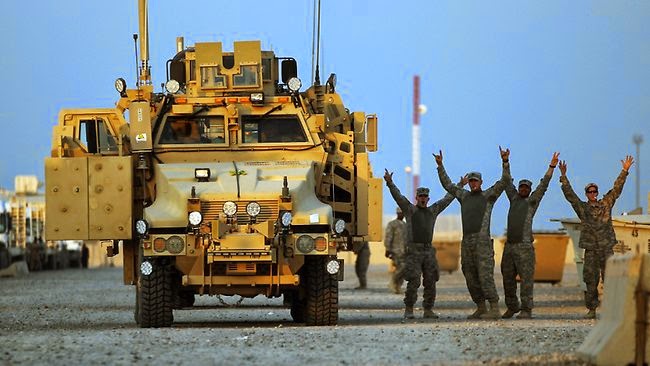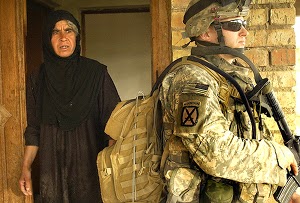I simply cannot stand this any longer – Republicans, and
especially neocons, trying to rewrite history and make claims that none of the
chaos unleashed in Iraq by ISIS would have occurred if President Obama hadn’t gotten
all squishy and pulled our troops out in 2011.
misconceptions is that they are coming from the lips of people like Paul Bremer
and Dick Cheney – men who got virtually everything about Iraq wrong.
say we should have kept thousands of troops in Iraq are the same chicken-hawks
who last year said to the president: Don’t you dare attempt to engage the U.S.
military in the bloody civil war in Syria.
the courage to campaign for election in 2010 on the premise that we should keep
our troops in Iraq longer.
 |
| U.S. troops celebrate withdrawal from Iraq in 2011 |
And there was no reason for risk. The most basic fact ignored repeatedly over the past 10 days is this: the troop withdrawal plan that Obama quickly arrived at was identical to the plan created by George W. Bush. This was not a partisan issue.
In November 2008 Bush signed — and praised — a Status Of Forces Agreement with Iraqi officials that would “advance a stable Iraq in the heart of the Middle East.” The pact called for U.S. troops to remain in Iraq for three years. The SOFA drew outrage from Iraqis and from much of the Arab world because it did not call for a quicker withdrawal of the occupying U.S. troops.
In October 2011, the Obama administration abandoned negotiations with Prime Minister Nouri al-Maliki’s government to revise the SOFA by keeping several thousand U.S. troops in the country to train Iraqi soldiers. The biggest sticking point was a demand by the Iraqi Parliament that U.S. troops face an Iraqi court if accused of violence or death. U.S. personnel stationed across the globe are traditionally subject to the Uniform Code of Military Conduct and have immunity from provincial and federal laws in the nation where they are deployed.
It took me about 30 minutes to compile some basic
information about the final months and years of the Iraq War that shows: the
vast majority of Americans wanted us out by the end of 2011; a majority told
pollsters that the war was a failure or, at best, a standoff, and we should
expect that the Iraqi military and government will crumble once we leave;
conservative pundits in 2009 were pleased that Obama decided to follow Bush’s plan to withdraw at the end of 2011; and the failure to reach an
agreement with the Iraqis on a continuing military presence was almost entirely
the fault of the Maliki government.
a 2011 pullout
January 2009, as Obama took office, pro-Bush conservatives correctly predicted that
Obama would begin to accept the Bush-Cheney anti-terror policies. Charles
Krauthammer wrote that the first vindication for the neocons was that Obama had
already agreed to follow the Bush plan on withdrawal from Iraq:
withdrawal from Iraq that does not destabilize its new democracy and that, as
Vice President-elect Joe Biden said just this week in Baghdad, adheres to the
Bush-negotiated status-of-forces agreement that envisions a U.S. withdrawal
over three years, not the 16-month timetable on which Obama campaigned.
Americans overwhelmingly wanted out
war was ending in mid-December 2011, showed that between 75 and 78 percent of
Americans approved of the removal of all combat troops. By any measure of public
opinion, those numbers are extraordinarily high. I recall being rather upset on
Dec. 15 when the official end of U.S. occupation received shockingly minimal
news coverage from all sectors of the media.
years of bloodshed and limited progress, said they would not be surprised in
the least if Iraq began to fall apart shortly after our troops left.
Essentially, what we are seeing in Iraq today, with a dramatic uptick in carnage
and sectarian violence, was predicted by the U.S. polity nearly three years
ago.
 |
| Iraqi woman observes U.S. soldier |
One Gallup poll taken Dec. 16-18, 2011, found that nearly
two-thirds of respondents said it was unlikely that the Iraqi military and
police could maintain security and it was also unlikely that the Iraqis would
be unable to prevent terror groups from using their country as a base of
operations for terrorist attacks.
early 2012, discussions began to bubble up about holding a parade or parades
welcoming back the Iraq War veterans. As
a sample of the nation’s mood at that time, interest in victory celebrations or
even a basic salute to our soldiers was fairly tepid.
not participate, particularly in plans for a big New York City parade, prior to the
end of the Afghanistan War. The reaction from the public was barely
a whimper.
possible
during that period in January 2009 when the Bush presidency was ending, pundits
told the war-weary nation that Bush had negotiated the best deal possible given
the intransigence displayed the Iraqi government of Nouri al-Maliki.
blunt message from Baghdad was: Get out. Here’s what Marc Lynch of Foreign Policy
magazine wrote at the time:
Agreement requiring the full withdrawal of U.S. military forces from Iraq on a
fixed 3-year timeline demonstrated a real flexibility on Bush’s part. It
demonstrated a pragmatism and willingness to put the national interest ahead of
partisanship that few of us believed he possessed. It is largely thanks to
Bush’s acceptance of his own bargaining failure that Barack Obama will inherit
a plausible route to successful disengagement from Iraq.
claim the SOFA as a “Bush-negotiated” success. But Bush entered the SOFA
negotiations looking for something entirely different than what emerged at the
end. The U.S. went into the SOFA talks intent on obtaining legitimacy for a
long-term military presence in Iraq once the (U.N.) Security Council mandate
ended.
 |
| Bush, al-Maliki seal the deal |
When negotiations began, it
was widely assumed that Bush would extract from the Iraqis an agreement which
made the removal of U.S. troops entirely contingent upon American assessments
of conditions on the ground. There were widespread discussions of
permanent U.S. bases and a Korea-style presence for generations, an assumption
that the U.S. would retain a free hand in its operations, and an absolute
rejection of an Obama-style timeline for withdrawal.
in the negotiations. Their tough line was encouraged by Iran, no doubt, as
stressed by many frustrated American commentators. But it also reflected Iraqi
domestic considerations, including several rounds of upcoming elections and an
intensely strong popular Iraqi hostility to the U.S. occupation under any name.
The Iraqis were also helped by the calendar.
the December 31 deadline loomed large, threatening to leave the U.S. troops
without any legal mandate to remain in the country and forcing the hand of
American negotiators. Finally, the Iraqi leaders clearly kept a careful
eye on the American presidential elections and used Obama’s stance to
strengthen their own hand in negotiations.
was already taking his revenge on Sunni Muslims, rounding people up. At the
same time, the prime minister looked the other way while Shiite militias
engaged in brutal revenge killings against Sunnis.
neocons who were still willing to talk about Iraq actually believed that a
residual U.S. force would keep the peace in Iraq. In fact, the end of the war
brought surprisingly little coverage from the media and the pundits. Here is
how the Inter Press Service summed up the situation:
in Iraq during this farewell period appear to agree on is that sectarian
tensions are once again on the rise, especially in the wake of sweeping
roundups of Sunni leaders associated with the U.S.-backed “awakening” movement
that was so critical to the surge’s success.
Kurdish-Arab fronts and the possibility of renewed civil war – or enhanced
Iranian influence – has been the focus of attack by critics of Obama’s decision
to withdraw all U.S. combat forces by the end of this month.
Republican Senators John McCain and Lindsay Graham, as well as
neo-conservatives, notably Fred Kagan, and other hawks, such as former U.N.
Ambassador John Bolton, have complained bitterly over the past week.
exert strong pressure on al-Maliki to agree to retain at least 14,000 U.S.
troops in Iraq to continue acting as a buffer between Kurds and Arabs in the
north, maintain pressure on the government for “national reconciliation”, curb
Iranian influence and ensure that threats from a possibly resurgent Al Qaeda in
Iraq would be dealt with swiftly.
remaining troops legal immunity from Iraqi prosecution.
according to a NBC News/Wall Street Journal survey released this week. A
majority of respondents said they thought “all-out civil war” was either “very”
(21 percent) or “somewhat likely” (39 percent) in the wake of the U.S.
withdrawal. A similar majority rated the chances of Iraq achieving a “stable
democracy” as either “somewhat” (32 percent) or “very unlikely” (28 percent).
71 percent of respondents believed that Obama’s decision to withdraw all combat
troops now was the right decision; only 24 percent disagreed.
strongly oppose the return of troops
sending any troops back into Iraq. According to The Hill, the survey released
Tuesday found that 74 percent of the public is opposed to sending combat troops back into
Iraq, with only 16 percent supporting that option.
renewed violence in Iraq is a result of a centuries-old conflict that was
worsened by the 2003 invasion launched by President George W. Bush. Twenty
percent, meanwhile, say the current situation is a result of the U.S. pullout
of Iraq in 2011.








